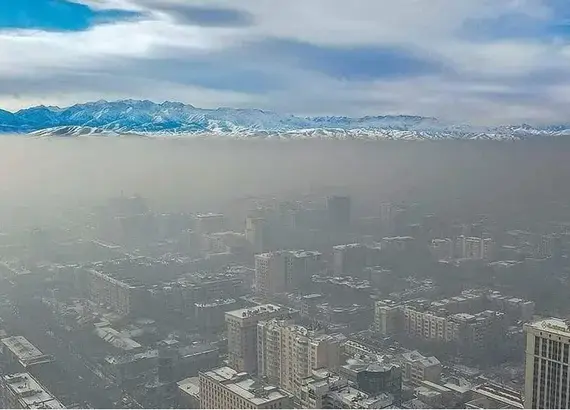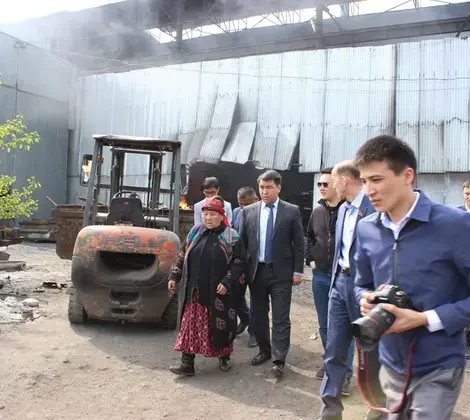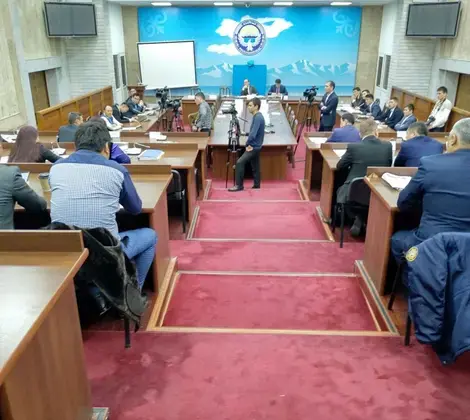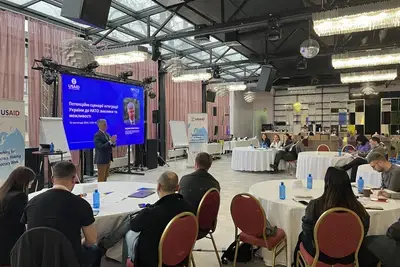
Success Story
Combating Air Pollution in Kyrgyzstan
Kyrgyzstan, known for its mountainous landscape and deposits of rare metals, is increasingly gaining recognition for another environmental factor: its air pollution. Air pollution in Kyrgyzstan’s capital, Bishkek, ranks as one of the worst levels in the world, and rates continue to rise. From November 2020 to February 2021, Bishkek’s citizens saw 32 days of hazardous air pollution, as measured by the Bishkek Air Quality Monitor at the U.S. Embassy in Kyrgyzstan. Public opinion research indicates citizen awareness of the negative effects of air pollution is increasing throughout urban centers in Kyrgyzstan. The percentage of those indicating the environment as the most important problem facing Kyrgyzstan doubled from 2017 to 2021. However, the long term effects of poor air quality on their health and wellbeing are not widely researched or published. Due to a lack of information on the factors and industries contributing to air pollution, regulations are often not data-driven. As eco-tourism becomes a larger part of the economy, this deadly silence may have an economic impact as the effects of air pollution are seen on Kyrgyzstan’s natural environment.

NDI’s six-stage policy development approach aims to create sustainable policy solutions by providing elected representatives with evidence, research and citizen input. When governments and citizens cooperate based on principles of good governance, the result is more effective policies that create resilient and inclusive solutions. Beginning in 2018, NDI guided the members of parliament through this process. NDI assisted MPs in identifying experts who could help them understand the key causes of Kyrgyzstan’s air pollution problem. The expert analysis determined that the main sources of air pollution in Kyrgyzstan’s major cities are vehicles, garbage burning landfills, and the use of coal as a heating source. Based on these research findings, NDI supported an expert to conduct a regulatory impact analysis demonstrating the impact of industries on the environment and the need for regulations, as well as their potential enforceability.
To better understand the effects of pollution in Kyrgyzstan beyond Bishkek, MPs determined it would be important to visit other major municipalities. Alongside local civil society organizations, such as Move Green, parliamentarians visited several facilities in Osh used to burn garbage and dispose of scrap metal where they saw first-hand the environmental impact of carbon emissions. The head of Move Green, Mariya Kolesnikova, reflected, “I had never thought there are parliamentarians who would be interested in environmental issues. This is a great piece of luck that we met with these parliamentarians, who helped us to communicate to the government and local administration about air pollution.” Through NDI-facilitated consultations with local experts and site visits, the parliamentarians identified carbon emissions from cars as a regulatory opening to seize. This visit gave MPs and representatives from Osh a clear understanding that air pollution is becoming a national problem.

The resulting Clean Air Bill subsequently needed to gain broader support among the public. While public hearings can only reach a handful of citizens, the media presents an opportunity to reach thousands more. NDI guided the parliamentarians in leveraging a variety of media outlets or platforms to broaden support for their initiative by developing messaging on the legislation that was accessible and clear for the public. The parliamentarians engaged citizens through parliamentary, social media, and broadcast shows, and explained the causes of this issue, its severity in Kyrgyzstan and its urban centers, and its varied levels of impact. With the onset of the global pandemic in March 2020, NDI trained the parliamentarians on digital tools to continue their progress identifying partnerships and framing arguments as the bill moved through parliament. In turn, citizens showed their support, with positive comments for the bill coming from across the country on social media.
As a result of these efforts, the Jogorku Kenesh, Kyrgyzstan’s parliament, passed the Clean Air Bill on June 25, 2020, and it was signed by the president a month later. According to the bill, companies that produce electric cars and vehicle parts in Kyrgyzstan have preferential conditions, including relief from value added tax and custom duties. The legislation seeks to incentivize electric car manufacturing through the exemption of certain customs and taxes. The effect of the statute also extends to companies that import electric cars to Kyrgyzstan. As a result of this legislation, a South Korean company has stated their intent to build a car manufacturing plant in the Issyk-Kul region by the end of 2022. The company will build electric car charging stations and initially produce 65,000 cars annually with a goal of 300,000 annually when the facility is established.
Following the successful passage of the Clean Air Bill, parliamentarians recognized that working within the policy development framework gave citizens political space to access information on environmental concerns and engage government officials to ensure policy on key issues remains data-driven and responsive to citizen interests. NDI’s six-stage policy development cycle allowed MPs to increase their knowledge and involvement not only in more effective and inclusive processes, but also in efforts to protect the environment and environmental stewardship. A domestic expert in environmental economics, Rakhat Sabyrbekov, stated, “Unfortunately, the policy development [cycle] is not common in Kyrgyzstan and most bills are adopted without proper research. Following the policy development cycle is a precedent in local politics and it is a great success”. The parliamentarians have not stopped there. Based on research and connections established through NDI support, the parliamentarians are currently working on two new initiatives aimed at further combating air pollution by protecting existing green spaces and banning low-quality fuel. They envision a future where Kyrgyzstan will once again be known for its pristine lakes, mountains, and preservation of natural resources.
NDI is a non-profit, non-partisan, non-governmental organization that works in partnership around the world to strengthen and safeguard democratic institutions, processes, norms and values to secure a better quality of life for all. NDI envisions a world where democracy and freedom prevail, with dignity for all.



